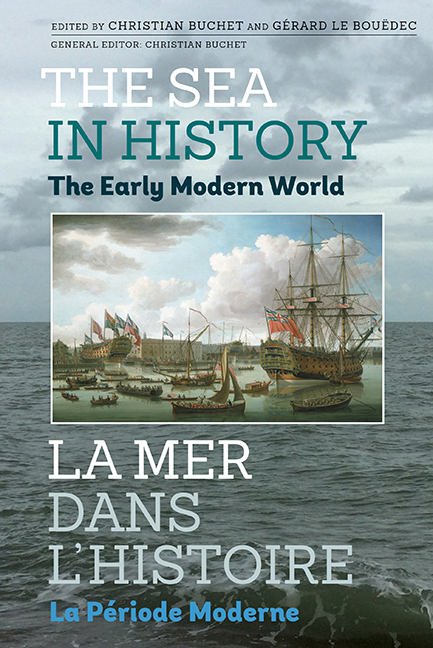Book contents
- Frontmatter
- Contents
- List of Illustrations
- List of Contributors
- Introduction générale et remerciements par
- General introduction and acknowledgements
- Introduction (français)
- Introduction (English)
- LA RÉUSSITE PAR LA MER:La reussite par la mer des territoires et des communautés littorales
- La construction d'un espace mondial: La circulation maritime et les ports
- La forte croissance de l'économie des pêches et des échanges
- Les acteurs de la dynamique maritime
- LA PUISSANCE MARITIME INSTRUMENT DE LA PUISSANCE POLITIQUE ET D'UNE STRATÉGIE GLOBALE DE RAYONNEMENT VOIRE DE DOMINATION: Les puissances maritimes occidentales
- L'océan Indien, entre convoitises et indifférences
- La Perse séfévide: au défi du « grand jeu » maritime (1501-1736)
- Le Grand Mogol et la mer
- Les puissances maritimes asiatiques
- L'Afrique
- La politique maritime et l'idéologie
- Mer et développement technologique
- Développement maritime et maîtrise économique et financière
- Développement maritime et maîtrise organisationnelle
- Conclusion (français)
- Conclusion (English)
- Conclusion générale par
- General conclusion by
- Miscellaneous Endmatter
- Miscellaneous Endmatter
Le Grand Mogol et la mer
from L'océan Indien, entre convoitises et indifférences
Published online by Cambridge University Press: 11 May 2017
- Frontmatter
- Contents
- List of Illustrations
- List of Contributors
- Introduction générale et remerciements par
- General introduction and acknowledgements
- Introduction (français)
- Introduction (English)
- LA RÉUSSITE PAR LA MER:La reussite par la mer des territoires et des communautés littorales
- La construction d'un espace mondial: La circulation maritime et les ports
- La forte croissance de l'économie des pêches et des échanges
- Les acteurs de la dynamique maritime
- LA PUISSANCE MARITIME INSTRUMENT DE LA PUISSANCE POLITIQUE ET D'UNE STRATÉGIE GLOBALE DE RAYONNEMENT VOIRE DE DOMINATION: Les puissances maritimes occidentales
- L'océan Indien, entre convoitises et indifférences
- La Perse séfévide: au défi du « grand jeu » maritime (1501-1736)
- Le Grand Mogol et la mer
- Les puissances maritimes asiatiques
- L'Afrique
- La politique maritime et l'idéologie
- Mer et développement technologique
- Développement maritime et maîtrise économique et financière
- Développement maritime et maîtrise organisationnelle
- Conclusion (français)
- Conclusion (English)
- Conclusion générale par
- General conclusion by
- Miscellaneous Endmatter
- Miscellaneous Endmatter
Summary
RÉSUMÉ. L'Inde du Grand Mogol n'est pas une zone irrémédiablement terrienne comme on l'a trop souvent considérée. La mer peut même être vue comme l'élément essentiel présidant à la réussite ou aux échecs des différents souverains sur plusieurs siècles. Le non-intérêt de Sher Shâh Sûri pour la mer et ses flux explique pour une bonne part son échec final. A l'inverse, Akbar (1566-1605), en désenclavant son empire avec la connexion des centres de production aux bandes littorales du Bengale et du Gujarat et en insufflant une politique mercantiliste fondée sur la notion d'hinterland, aboutit à la création de villes prospères nées aux carrefours des routes marchandes sur une connectivité maritime, et se vit attribuer le titre de « Grand Moghol ». Une oeuvre interrompue par ses successeurs Jahangir (1605-1627) et Chah-Jahan (1628-1657), mais reprise avec Aureng-Zeb (1659-1707) qui alla jusqu'à déplacer la capitale au sud, à Aurangabad, emplacement géo-économique pour être située au carrefour des deux régions maritimes de Golconde et de Bijapur, qui lui permit, par les effets induits au plan fiscal, de consolider son empire et de maîtriser les soulèvements marathes.
ABSTRACT. Grand Mughal India is not an irremediably landlocked zone as it is often described. The sea can be seen as an essential element presiding over the successes or the failures of different sovereigns over several centuries. The non-interest of Sher Shâh Sûri in the sea and its flows explains for a good part his ultimate failure. On the other hand, Akbar (1566-1605) broke the isolation of his empire by connecting it to production centres on the Bengali and Gujarat coastal strips, and inspired mercantile politics based on the notion of the hinterland, and succeeded in creating prosperous cities situated at the crossroads of trade routes of maritime connectivity and thus gained for himself the title of the ‘Grand Mughal’. His successors, Jahangir (1605-1627) and Chah-Jahan (1628-1657), and then Aureng-Zeb (1659-1707) continued his work that included moving the capital to the south in Aurangabad, a geo-economic position situated at the intersection of two maritime regions, Golconda and Bijapur. These accomplishments allowed Aureng-Zeb to consolidate his empire and master the Maratha uprisings thanks to increased fiscal revenues.
- Type
- Chapter
- Information
- The Sea in History - The Early Modern World , pp. 539 - 548Publisher: Boydell & BrewerPrint publication year: 2017



